 Petzlover
Petzlover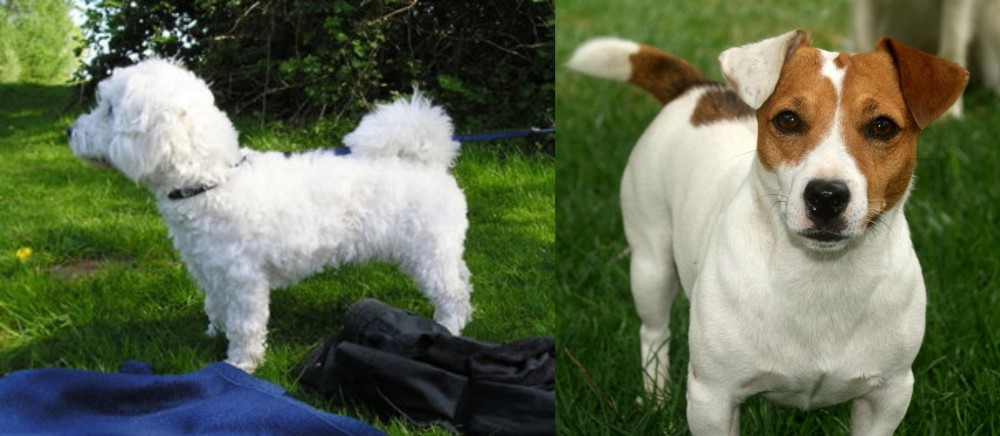 Franzuskaya Bolonka is originated from France but Irish Jack Russell is originated from United States. Franzuskaya Bolonka may grow 8 cm / 3 inches shorter than Irish Jack Russell. Both Franzuskaya Bolonka and Irish Jack Russell are having almost same weight. Both Franzuskaya Bolonka and Irish Jack Russell has same life span. Franzuskaya Bolonka may have less litter size than Irish Jack Russell. Both Franzuskaya Bolonka and Irish Jack Russell requires Low Maintenance.
Franzuskaya Bolonka is originated from France but Irish Jack Russell is originated from United States. Franzuskaya Bolonka may grow 8 cm / 3 inches shorter than Irish Jack Russell. Both Franzuskaya Bolonka and Irish Jack Russell are having almost same weight. Both Franzuskaya Bolonka and Irish Jack Russell has same life span. Franzuskaya Bolonka may have less litter size than Irish Jack Russell. Both Franzuskaya Bolonka and Irish Jack Russell requires Low Maintenance.
 The Franzuskaya Bolonka in France is known as the Tsvetnaya Bolonka in Russia and in Germany as the Bolonka Zwetna. All of these translate to Colored Bolognese. It is known as the “Pride of Russia” and was rediscovered by the Russians following the thaw of the Cold War. It is also sometimes translated as a colored lapdog.
The Franzuskaya Bolonka in France is known as the Tsvetnaya Bolonka in Russia and in Germany as the Bolonka Zwetna. All of these translate to Colored Bolognese. It is known as the “Pride of Russia” and was rediscovered by the Russians following the thaw of the Cold War. It is also sometimes translated as a colored lapdog.
The Bolonka is a rare breed in the toy category with ancestors in the Bichon Friese line. This little dog looks very much like the national dog of Cuba – the Havanese. In addition to the Bichon other small dogs in this ancestral line include the Shih Tzu, Toy Poodle, and Pekingese as well as the French, Italian and German Bolonka. They are often confused with the Bolognese as both breeds appear in various countries and have many similarities.
In all countries the common name for this dog is the Bolonka. They have a variety of names and nick names depending on the country. In addition to being the “Pride of Russia” he is called a Russian colored Bichon, Czechs call it the Bareyny Bolonsky, the Germans since 1980 have called it the Bolonka Zwetna but the Nordic Kennel Union does not recognize the Zwenta only the Russian Twetnaya.
The French version is seen to be the original with its ancestry dating back to the 18th century when Russian nobles were presented with a Bolonka by Louis XIV of France, and others migrated with the army of Napoleon to Russia. They were still known as the Bolonka of France. Small dogs were not popular in Russia due to the need for dogs that could work on farms and/or hunt. Particularly during the Soviet years, they were considered unnecessary. No Bolonkas were imported to Russia during the Soviet regime, so only localized breeding took place. The goal of breeders in the Soviet Union was to develop a toy dog, lap sized with an apartment living temperament.
During the cold war the Russians sent a pair of breeding Franzuskaya Bolonka to East Germany and they began to develop the breed there as well. At the same time the colored versions of the Bolonka were being bred. The Franzuskaya Bolonka is recognized by the Verband Dur Das Deutsche Hundewesen (VDF) while the other colored breeds are not. The white Bolonka is not recognized by the Federation Cynoloqique Internationale as a breed separate from the Bolognese but as simply another version. Individual clubs throughout the world recognized one or more versions of the Bolonka. They are thought to be the rarest within the Bichon family.
Today’s Bolonka is owed by Prince William and Princess Kate, giving the breed more publicity than it has had in many years.
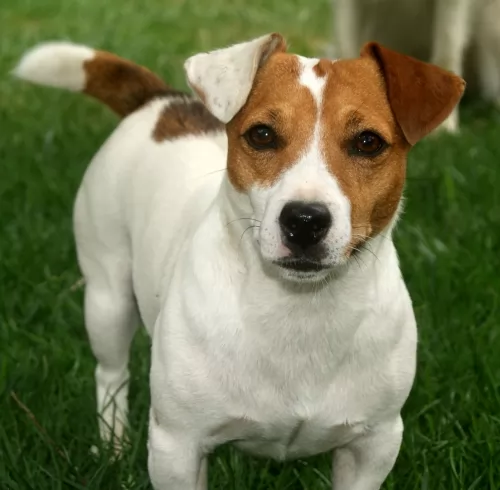 Originating in the United States of America, the Irish Jack Russell, also known as Short Jack Russells, was bred to bring about a calmer temperament and to also have a dog with shorter legs.
Originating in the United States of America, the Irish Jack Russell, also known as Short Jack Russells, was bred to bring about a calmer temperament and to also have a dog with shorter legs.
Always a working dog, breeders of the Irish Jack Russell wanted to create a dog with less of a hunting instinct in him and have a dog which would be more companionable.
These Irish Jack Russells look much like your regular Jack Russell but are more of a companion dog than a hunting dog. The Irish Jack Russell doesn’t adhere to any existing Jack Russell breed standard and isn't really recognized at major dog clubs and kennels. The truth of the whole matter is that there are different kinds of Jack Russells and different names given to them to differentiate between the taller Jack Russell and the short legged one. The shorter Jack Russell Terriers are known by many names such as Irish Jack Russell and Shorty Jack Russells.
 The Franzuskaya Bolonka is neither heavy boned nor fine boned. They are a toy breed with a moderate bone structure. The ears are neither long nor short and they have tails that touch the back at the tip. Like others in the Bichon family the Franzuskaya Bolonka does not shed. He is a sturdy little dog and the male has a distinct beard and moustache that the females of the breed do not. They have long coats that are wavy and curly. The Franzuskaya Bolonka is of course only white. The Russian version might be brown, red, black, wolf-gray, gray and of course white.
The Franzuskaya Bolonka is neither heavy boned nor fine boned. They are a toy breed with a moderate bone structure. The ears are neither long nor short and they have tails that touch the back at the tip. Like others in the Bichon family the Franzuskaya Bolonka does not shed. He is a sturdy little dog and the male has a distinct beard and moustache that the females of the breed do not. They have long coats that are wavy and curly. The Franzuskaya Bolonka is of course only white. The Russian version might be brown, red, black, wolf-gray, gray and of course white.
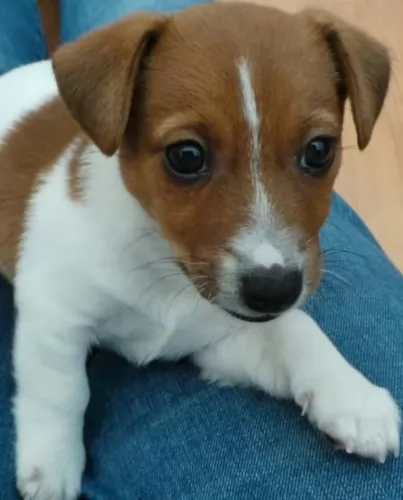 Irish Jack Russells are small dogs standing at roughly 18 to 35cm and weighing in the region of 5 to 8kg for both males and females.
Irish Jack Russells are small dogs standing at roughly 18 to 35cm and weighing in the region of 5 to 8kg for both males and females.
He looks much like your regular Jack Russell but he has shorter legs, and where the regular Jack Russell has an essentially white coat with orange-tan patches, the Irish Jack Russell can be solid tan or other color variations such as red, brindle, black and tan.
The coat can be short or fairly long and coarse. The Irish Jack Russell is a sturdy, compact dog with a flat skull, brown eyes and ears which are semi-erect, semi-floppy. He has a bright, alert, intelligent look on his face. The tail is set fairly high and has always been docked but these days it is inclined to be left long, taking away from the dog’s nice compact look.
The Irish Jack Russell is perhaps more placid than the regular Jack Russell and that is why he can adapt to life in the city or in the country. They’re intelligent dogs and therefore easy to train and have socialized.
Even though he is a small dog, training and socialization is important as he is a feisty, stubborn, know-it-all little dog. These are dogs which can become possessive of their owner and they can become quite aggressive when protecting their family. He is a highly trainable dog but it is important to have him trained as he tends to be aggressive with other dogs.
He is busy, active, happy and inquisitive and will require regular exercise to prevent him becoming restless and destructive. He has been a working terrier and he always wants to be busy.
 The Bolonka is great with kids, just avoid too intense play.
The Bolonka is great with kids, just avoid too intense play.
The Bolonka is a playful, lap dog with a lot of love to offer
Good adaptability great in the city in apartments and great in the country as well
They are very smart and love to learn. Being firm but beyond firm is also kind.
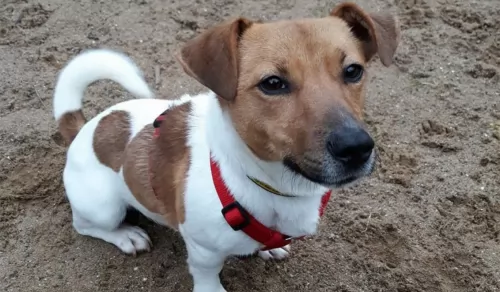 The Irish Jack Russell is a self-confident, energetic dog who will like nothing more than to be involved with everything you’re doing. The busier he is the better, and because he has strong hunting instincts you may find him digging in your garden for rats.
The Irish Jack Russell is a self-confident, energetic dog who will like nothing more than to be involved with everything you’re doing. The busier he is the better, and because he has strong hunting instincts you may find him digging in your garden for rats.
Have him trained and socialized if you want to avoid certain problems with him and remember to exercise him and provide him with the attention he craves.
He is a social dog and will pine away if you just leave him to get by on his own. Make sure that he becomes every bit as part of your family as everyone else and he promises to make you a loyal, devoted companion.
 Medical issues are not fully documented because of the rarity of the breed and the years of isolation in the Soviet Union.
Medical issues are not fully documented because of the rarity of the breed and the years of isolation in the Soviet Union.
 Your Irish Jack Russell is a dog that doesn’t battle with too many health issues, but nonetheless you still need to watch out for common health problems.
Your Irish Jack Russell is a dog that doesn’t battle with too many health issues, but nonetheless you still need to watch out for common health problems.
Jack Russell terriers are generally a healthy breed that can live up to 14 years of age, but still every dog is prone to the more common dog problems such as hip dysplasia, bloat, ear infections and dental disease among others.
If your Irish Jack Russell is in pain, he is lethargic and sick, don’t delay – take him to the vet right away.
 Feed at least 3 meals a day. Feed one fourth of a cup daily split into three meals of a high quality puppy food.
Feed at least 3 meals a day. Feed one fourth of a cup daily split into three meals of a high quality puppy food.
Feed at least 2 meals per day. Feed one half of a cup daily split into two meals of a high quality dry food.
Fairly healthy breed due to isolation during cold war
The Franzuskaya Bolonka is developed as a lap dog but that does not mean he doesn’t need daily exercise. He loves to play but play gently and not for any length of time. They like to chase balls, play hide and seek and any tricks you want to teach them.
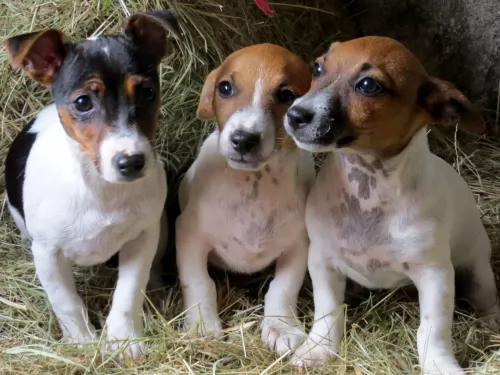 The Irish Jack Russell is an average shedder with his short or longish coat which is easy to groom, requiring a brush once or twice a week. His nails grow quickly too and they can get caught on something and cause him damage. Trim your pet’s nails to prevent this.
The Irish Jack Russell is an average shedder with his short or longish coat which is easy to groom, requiring a brush once or twice a week. His nails grow quickly too and they can get caught on something and cause him damage. Trim your pet’s nails to prevent this.
Feed your Irish Jack Russell good quality dog food each day. If you feed him commercially manufactured dog food, be certain to check the feeding instructions on the packaging.
He is a small dog, and overfeeding can be just as bad as under-feeding. It’s never a good idea to just go on and on feeding your pet dry or wet kibble day after day. Add in some cooked chicken, rice, pasta and vegetables as a treat and to also provide some variety for him.
Also a little bit of raw meat occasionally can do him the world of good and you’ll see the appreciation in his bright eyes and wagging tail.